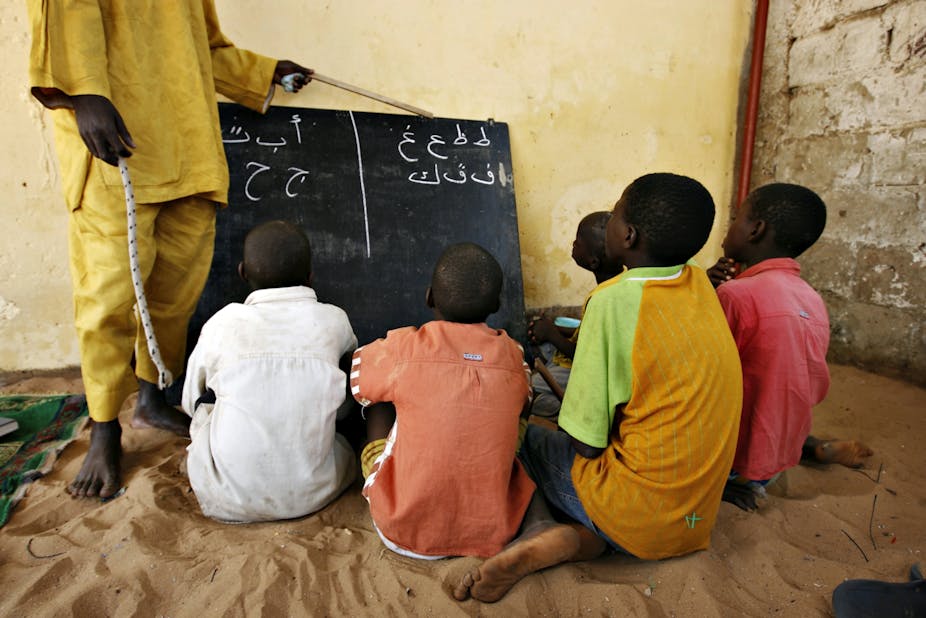Senegal is a deeply religious country. About 90% of the West African nation’s residents are Muslim, about 5% are Christian and the rest identify as animist – they believe that natural objects, idols or fetishes have magical power. Many Senegalese embrace at least some elements of animism even if they are Muslim or Christian.
In spite of its citizens’ beliefs, the West African nation is a secular state. This was enshrined in its 2001 Constitution – as was religious freedom. This disconnect between people’s daily experiences and the country’s guiding legislation has set up an interesting battle in Senegal’s classrooms.
Schoolteachers who are personally religious must work in a secular space that marginalises religious discourse and knowledge. But how do they balance their beliefs with their responsibility? And how does it affect their students’ learning?
Resistance to science in the class
About 73% of Senegal’s children are enrolled in primary school, and the retention rate into secondary school is high. Literacy rates were last measured in 2011 at about 66%.
The Senegalese educational system is managed by multiple operators: the state, religious authorities and private groups. Some are registered with the education ministry. They are French language schools, inherited from the colonial era with curricula defined by the government. Most of these schools are secular, though some are run by the Catholic church.
The second category of school is not registered with the authorities. This includes daraas, or Koranic schools, and schools which offer a Muslim education in the French language. In daraas, the curriculum is mainly based on reciting the Koran and learning about Islamic studies and law. Scientific subjects are not part of the teaching programme.
Research indicates that many Senegalese children will attend at least a year or two of Koranic school before moving into the formal system.
There is no blackboard and no exercise book, only a Koran and a wooden tablet called an aluwa on which the master and pupil write with a feather dipped in ink. The daaras use a different cognitive style from the one we know in Western education. It uses oral learning and memorisation to influence the pupils’ behaviour and the reproduction of the moral and societal values which are passed onto them.
The pupils are also expected to spend several hours of each day begging for food and money. Corporal punishment is common, and is considered by the marabouts (religious teachers) as having an essential religious dimension.
In the formal schools, science (including the theory of evolution) forms part of the curriculum – but I discovered that teachers who are religious try to manage how it is taught in three ways. The first kind of teacher presents both the science curriculum and religious beliefs about science as theories. He will appear to be neutral in his views, while subtly presenting religion as “better” than science.
The second sort of teacher will stick to the official curriculum – at least until the formal lesson is completed. When it is over, the teacher will tell her class that she was just doing her job and does not believe what she has said. This is obviously a far more explicit approach to placing religion above science.
Then there’s the third kind of teacher, who sticks mostly to the curriculum and, in the last moments of the class, inserts biblical or Koranic knowledge. This approach differs from that of the first group of teachers because it doesn’t openly question the superiority of science. Instead, these teachers throw religious ideas or beliefs into the mix almost as an afterthought.
Teachers face no opposition
The teachers I interviewed believe these practices can be justified. They say everybody has the right to choose between science or religion, but one should not be allowed to dominate the other. They are opposed to scientific processes that they feel allow humans to substitute themselves for God. Some told me that if intellectuals and academics read the Bible or Koran more, science would progress faster – because these holy texts inspire discoveries.
The teachers in secular schools who prioritise religion don’t face any real opposition. Their pupils often come from religious families and they openly denounce the theory of evolution when it is discussed in class. They accept that they must learn about it for their exams and to complete school successfully.
The Ministry of Education does not intervene, partly because its own officials are religious and do not think there’s anything wrong with what the teachers are doing. The state also seems to know that there are far too many teachers for it to fight.
Perhaps what the teachers are doing is a form of decolonisation. Some of the Senegalese, particularly those from working class areas, believe the secular schools represent French colonisers. They work within these spaces but bring their own beliefs to their classrooms.

